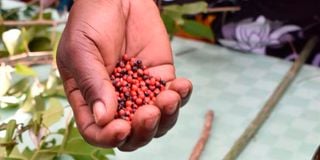Breakthrough in sight for family planning herb

What you need to know:
- The Waatha community, who used to live in coastal forests, has been using the seeds to space the siring of children.
- But last year, officials from the National Museums of Kenya (NMK) got wind of the natural contraceptive and began researching its efficacy, safety and dosage.
She felt queasy and peaky whenever she used contraceptives. This sickish feeling came with excessive bleeding and a constant headache that all combined to kill her sexual urge.
Josephine Karisa got three unplanned pregnancies while on family planning against her husband’s expectations, who went to hospital to seek intervention.
“He asked the medic how I got pregnant while on family planning only to be told that the drug I was injected had expired,” the 45-year-old revealed.
In an interview with Healthy Nation in Arabuko Sokoke, Kilifi County, Josephine said her husband, Karisa Dakawale, advised her to stop using the drug as they sought alternatives. Her husband introduced her to a traditional family planning method that she has been using for four years now.
“I took five mturituri seeds and to date, I have never given birth or menstruated, it has no side effects,” says Josephine. But it had taken her husband a lot of effort to persuade her to use natural contraception.
“When we had six children, we didn’t want more. It pained me that she would get sickly after getting the contraceptive injection. Then her sexual sensuality would disappear,” recalls Karisa.
He was therefore thrilled when the mturituri (Commiphora africana) seeds worked magic on her, and that pronounced the rekindling of a happy marriage life that was almost shattered by chemical contraceptives.
According to World Agroforestry, Commiphora africana is a shrub found all over Africa that grows on rocky sites, clay or sand with minimal rainfall, typical of thorn bush in Kenya and Tanzania.
It is a spiny shrub but may become a tree that grows to a maximum of 10 metres. Its leaves are soft, hairy and bright green, compound with three leaflets, edge wavy, fragrant when crushed and the central leaflet much longer than the other two. The fruit is small, pink-red, soft and pointed with a stony seed inside.
Coastal forests
The Waatha community, who used to live in coastal forests, has been using the seeds to space the siring of children. But last year, officials from the National Museums of Kenya (NMK) got wind of the natural contraceptive and began researching its efficacy, safety and dosage.
Ms Tabu Batula, 50, a member of the community, says when Kenya got independence in 1963, the Waatha people decided to leave the forests to join the rest of Kenyans.
“But our husbands warned us against using conventional medicines including family planning. We were told to stick to our culture of using roots and trees,” said Ms Batula.
The mother of nine said were it not for the seeds, she could have borne 20 children like women from her community.
The Kenya Medical Research Institute (Kemri)’s Medical Biochemist, Dr Amos Lewa, came across the plant while working closely with the community on other herbs. “I started researching it and realised India has been using it. We collaborated with the Waatha and other stakeholders and took the seed for more research,” said Dr Lewa.
The biochemist has been making 500mg mturituri tablets and selling them to women in Mombasa and Nairobi counties at Sh2,000.
A tablet, Dr Lewa said, prevents a woman from conceiving for three months. “Two tablets for two years, while three for five years. It also prevents ovulation,” revealed Dr Lewa.
NMK under the Institute of Primate Research (IPR)’s Chief Researcher, Dr Atunga Nyachieo, said the government began researching on mturituri last July using 12 baboons to verify if the seed can prevent conception and its side effects.
“The government wants communities that have indigenous knowledge on traditional medicines to benefit from that knowledge to also boost the health sector like China, Brazil and Europe, which have industrial herbal products,” said Dr Nyachieo.
The researcher said countries that have embraced herbal products are benefiting, citing the anti-malaria drug discovered in Southern China. Dr Nyachieo said when the Chinese government realised a community in Southern China had been using herbal medicine to cure malaria, they collaborated with the herbalists to do more research.
“When they confirmed it was working, the state invested in the project. Currently, the world buys malaria drugs from China. In Kenya, we have the capacity, expertise and indigenous knowledge,” said Dr Nyachieo.
Dr Nyachieo noted that globally, pharmaceutical companies are searching for an acceptable contraceptive without side effects, within the control of the female partner.
National Products Industry National Coordinator, Dr Evans Taracha, said pre-clinical trials show that when the seed is administered to baboons of reproductive age, they cannot be impregnated.
“The first test we have administered mturituri powder to baboons and it has demonstrated that it can prevent conception. We have realised that by withdrawing its use, baboons get pregnant, meaning the effect is not permanent, it is reversible and that’s very important. We are repeating the experiment in a larger number of baboons,” explained Dr Taracha.
However, Dr Taracha said the scientists discovered that if the baboon is not given the seed after two or three months, they can get pregnant.
“It has an anti-conception effect, which is reversible. Meaning once the seed passes the efficacy, dosage and safety tests, we will try them on women and later start preparing them for usage. We are using baboons because human genetics are likened to baboons,” said Dr Taracha, adding that the first test in the baboons is promising.
“Nine are experimental and three are controlled. We are repeating to show that this effect is repeatable and therefore we can now move to the next big stage of conducting clinical trials in women. We will do it in partnership with the Ministry of Health.
“After demonstrating the pre-clinical trials using baboons and showing it is repeatable, we will move to the next stage of clinical trials. We are giving ourselves six months from now to have finalised our trials in baboons so that we can now move to clinical trials,” added Dr Taracha.
Dr Taracha said mturituri is going to be a breakthrough because currently contraceptives used by women globally are hormonally based, associated with serious health shortcomings and side effects including weight gain and cancer.
The plant is also found in the Rift Valley and western Kenya but it is of different variety and has other uses including controlling blood sugar.
“Plants are shaped by the environment they grow in so those found in Rift Valley and western Kenya are different,” added Dr Taracha.
For sustainability, NMK is collaborating with Kenya Forest Research Institute, Kenya Wildlife Service, Kenya Forest Service, and other agencies to ensure mturituri is planted on a large scale to protect it from extinction as the government moves to exploit it for the production of natural contraceptives. Dr Taracha said the plant will be turned into a cash crop because there will be a ready market.
“After trying it on humans, the researchers will move to small-scale production, retest again, engage in larger-scale production and retest to ensure it doesn’t change any character. Thereafter we will go to the market involving several partners,” said Dr Taracha.
Dr Taracha said scientists are also conducting scientific validation to have the product acceptable both locally and globally.
This comes as the government seeks to legalise traditional herbalists to boost Kenya’s health care system and further preserve indigenous knowledge and genetic resources for national development.





